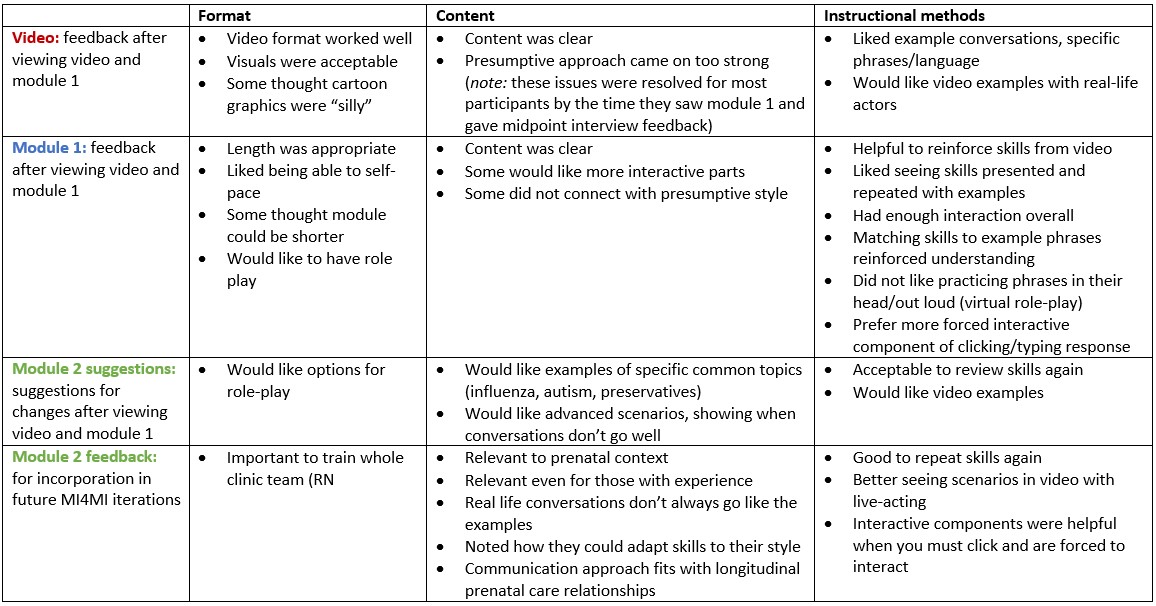Immunizations/Delivery
Category: Abstract Submission
Immunizations/Delivery I
508 - Motivational Interviewing for Maternal Immunizations: Intervention Development
Sunday, April 24, 2022
3:30 PM - 6:00 PM US MT
Poster Number: 508
Publication Number: 508.325
Publication Number: 508.325
Jessica R. Cataldi, University of Colorado School of Medicine and Children's Hospital Colorado, Aurora, CO, United States; Mary Fisher, University of Colorado School of Medicine, Aurora, CO, United States; Sarah E. Brewer, University of Colorado School of Medicine, Aurora, CO, United States; Christine Spina, University of Colorado School of Medicine, Aurora, CO, United States; Cathryn Perreira, University of Colorado, Anschutz - ACCORDS, Aurora, CO, United States; Fiona B. Cochran, University of Colorado School of Medicine, Boulder, CO, United States; Sean T. O'Leary, University of Colorado School of Medicine, Denver, CO, United States

Jessica R. Cataldi, MD, MSCS (she/her/hers)
Assistant Professor of Pediatrics
University of Colorado School of Medicine
Aurora, Colorado, United States
Presenting Author(s)
Background: Despite recommendations for influenza and Tdap (tetanus, diphtheria and pertussis) vaccination during pregnancy, uptake was only 55% for influenza, 54% for Tdap and 31% for both vaccines during the 2020-21 influenza season. Provider communication interventions have improved vaccine uptake in pediatric settings.
Objective: To describe development and acceptability of a vaccination communication training intervention (Motivational Interviewing for Maternal Immunizations [MI4MI]) among prenatal care providers and staff.
Design/Methods: Design of the MI4MI intervention was based on structure and content of similar provider communication training interventions for pediatric vaccination, including presumptive initiation of vaccines (“we have some shots to do today”) combined with motivational interviewing for hesitant patients. Interviews and focus groups (FGs) were conducted with prenatal care providers and staff in Colorado before, during and after MI4MI implementation. Data collected included vaccine strategies used with pregnant patients and needs for adapting to the prenatal care setting (for intervention development), and experience with materials already viewed (for acceptability). Iterative changes were made to training components to incorporate feedback.
Results: Three virtual, asynchronous training components were created to teach core components of MI4MI (Table 1). Results from 12 interviews and 6 FGs (28 FG participants) guided intervention adaptation to prenatal care settings and a virtual format (Table 2) and assessed MI4MI acceptability. Based on participant feedback, example scenarios showed commonly reported vaccine communication challenges and scenarios in the final training module were presented as live-action videos and full conversations. Participants favored a virtual format because group meetings are challenging to schedule and attend; however, they noted opportunities to practice communication skills with colleagues were lacking. They reported content was easy to understand and fit a prenatal care context, and they liked the self-paced style, interactive components and use of adult learning principles to accommodate varied learning styles (Table 1). A subset of participants were initially resistant to the presumptive approach, but later found it useful after applying and adapting the approach to better fit their style.Conclusion(s): The MI4MI intervention was seen as relevant and valuable for prenatal care providers and staff. Suggestions to make training more interactive and include more complex scenarios should be incorporated into future iterations of the MI4MI intervention.
Table 1: MI4MI Communication Training Intervention Components.jpg)
Table 2: Participant Feedback on MI4MI Intervention by Training Component
Objective: To describe development and acceptability of a vaccination communication training intervention (Motivational Interviewing for Maternal Immunizations [MI4MI]) among prenatal care providers and staff.
Design/Methods: Design of the MI4MI intervention was based on structure and content of similar provider communication training interventions for pediatric vaccination, including presumptive initiation of vaccines (“we have some shots to do today”) combined with motivational interviewing for hesitant patients. Interviews and focus groups (FGs) were conducted with prenatal care providers and staff in Colorado before, during and after MI4MI implementation. Data collected included vaccine strategies used with pregnant patients and needs for adapting to the prenatal care setting (for intervention development), and experience with materials already viewed (for acceptability). Iterative changes were made to training components to incorporate feedback.
Results: Three virtual, asynchronous training components were created to teach core components of MI4MI (Table 1). Results from 12 interviews and 6 FGs (28 FG participants) guided intervention adaptation to prenatal care settings and a virtual format (Table 2) and assessed MI4MI acceptability. Based on participant feedback, example scenarios showed commonly reported vaccine communication challenges and scenarios in the final training module were presented as live-action videos and full conversations. Participants favored a virtual format because group meetings are challenging to schedule and attend; however, they noted opportunities to practice communication skills with colleagues were lacking. They reported content was easy to understand and fit a prenatal care context, and they liked the self-paced style, interactive components and use of adult learning principles to accommodate varied learning styles (Table 1). A subset of participants were initially resistant to the presumptive approach, but later found it useful after applying and adapting the approach to better fit their style.Conclusion(s): The MI4MI intervention was seen as relevant and valuable for prenatal care providers and staff. Suggestions to make training more interactive and include more complex scenarios should be incorporated into future iterations of the MI4MI intervention.
Table 1: MI4MI Communication Training Intervention Components
.jpg)
Table 2: Participant Feedback on MI4MI Intervention by Training Component

